Papers by Ariunaa Enkhtur
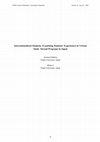
IAFOR Journal of Education, 2024
This paper explored students' experiences in an international virtual student mobility (VSM) prog... more This paper explored students' experiences in an international virtual student mobility (VSM) program at a Japanese national university implemented in collaboration with partner universities in the Asia Pacific region and Europe. Through students' narratives, the study discerned how students perceive "mobility" and the concept of "international students" after participating in a virtual student mobility program. Findings revealed a tension between students' understanding of "mobility," official narratives, and students' actual experiences. While VSM programs facilitate communication and knowledge exchange across borders and develop cross-cultural communications, prevailing binary definitions in student mobility, such as "inbound" vs. "outbound," "domestic" vs. "international," or "study abroad" vs. "internationalization at home," limit VSM potential to be fully realized. This misalignment of the traditional understanding of student mobility that emphasizes place and borders challenges the official narrative of student mobility and urges educators to realign and re-frame how we understand "international students."
arXiv (Cornell University), Nov 23, 2023
This scoping review explores the ethical challenges of using ChatGPT in higher education. By revi... more This scoping review explores the ethical challenges of using ChatGPT in higher education. By reviewing recent academic articles in English, Chinese, and Japanese, we aimed to provide a deep dive review and identify gaps in the literature. Drawing on Arksey & O'Malley's (2005) scoping review framework, we defined search terms and identified relevant publications from four databases in the three target languages. The research results showed that the majority of the papers were discussion papers, but there was some early empirical work. The ethical issues highlighted in these works mainly concern academic integrity, assessment issues, and data protection. Given the rapid deployment of generative artificial intelligence, it is imperative for educators to conduct more empirical studies to develop sound ethical policies for its use.
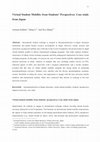
Higher Education Forum, 2023
International student exchange is integral to internationalization at higher education institutio... more International student exchange is integral to internationalization at higher education institutions and global human resource development in Japan. However, border closures and restrictions on physical mobility since 2020 due to the Covid-19 pandemic forced universities to adopt virtual mobility models to deliver international exchange programs. This study explores students' experiences of taking virtual exchange programs and their pedagogical implications for future virtual exchange programs. In this paper, we present one case of virtual student mobility implemented at one national university in Japan. Analysis of multiple data sets, including student surveys (n=789), reflection papers (n=420), and interviews with a program administrator and a faculty member, revealed that this type of virtual student mobility program has strong merits in promoting internationalization activities. Students were satisfied with the diverse interdisciplinary academic content, flexibility in taking the course, and opportunity to engage with the host university faculty members and international students. Many have expressed their interest in studying at the host university in person.
ECNU Review of Education, 2024
This study examined the role of virtual student mobility (VSM) programs in developing internation... more This study examined the role of virtual student mobility (VSM) programs in developing international education partnerships and explored key factors for building successful transnational partnerships. Design/Approach/Methods: Drawing on Yin's case study approach, we explored several VSM programs offered by a Japanese national university in partnership with four research universities in China. Data sources included an autoethnographic account of planning and organizing virtual exchange programs and interviews with the partner universities' virtual exchange program coordinators as well as with students who took different virtual exchange courses under the partnership.
Asia Pacific Journal of Education, 2019
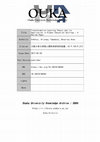
A highly influential report by the Lancet Commission in 2010 called for a major reform of health ... more A highly influential report by the Lancet Commission in 2010 called for a major reform of health professional education worldwide and proposed that transformative learning (TL) should be the main vehicle and outcome of this process (Frenk and Chen et al., 2010, p.6). Transformative learning, it was argued, would produce health professionals who are enlightened agents of change (ibid). The idea of TL is not new and its roots can be dated back to Paulo Freire’s critical pedagogy, outlined in his seminal work Pedagogy of the Oppressed (1968, 1970), and Jack Mezirow’s idea of perspective transformation, introduced in 1978 and then developed into the theory of TL (Mezirow, 1991). While Freire was interested in the possibilities of education as an emancipatory vehicle for the poor and illiterate in Latin America, Mezirow’s concerns were with Adult Education and individual transformation. Early work on transformative learning focused on cognitive and rational processes that prompted critic...
Academic Mobility and International Academics, May 3, 2022
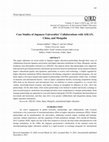
Journal of Comparative & International Higher Education, 2021
This paper elaborates on recent trends in Japanese higher education partnerships through three ca... more This paper elaborates on recent trends in Japanese higher education partnerships through three cases of collaboration between Japanese universities and higher education institutions in China, Mongolia, and the Southeast Asia (hereinafter referred to as ASEAN). Our analysis shows that partnerships were shaped by both top-down government policies and bottom-up institutional visions and past relations. Japan’s educational quality and reputation, particularly in science and technology, is highly regarded by higher education institutions (HEIs) interested in developing competitive international programs to prepare a globally skilled workforce. On one hand, Japan is striving to deepen and expand its partnerships with HEIs, particularly within Asia. A number of domestic and international factors - such as Japan’s population decline; increasing competition among HEIs both on the domestic and international front; an ambition to remain competitive in a twenty-first century, knowledge-based ec...

Asian Education and Development Studies, 2019
Purpose The purpose of this paper is to explore how Mongolian alumni of three different scholarsh... more Purpose The purpose of this paper is to explore how Mongolian alumni of three different scholarship programs sponsored by governments of Japan and Mongolia view their role in national development after graduation. Design/methodology/approach This paper reports findings from a phenomenological study (Creswell, 2007) – the first phase of an exploratory sequential mixed-methods study in a recent PhD study. Based on semi-structured interviews with 24 alumni the study aimed to understand alumni’s perspectives in their voices. Findings Alumni were motivated to contribute to their communities, institutions, economic, political, social and legal conditions of Mongolia. However, they faced various structural challenges including getting jobs in the public sector even when they had binding agreements with employers. The findings call for long-term support for alumni projects and hubs as well as policy frameworks that tie the scholarship programs with national development goals. Originality/va...

COVID-19 disrupted international student mobility with border closures, lockdowns and severe rest... more COVID-19 disrupted international student mobility with border closures, lockdowns and severe restrictions on physical movement. However, surveys find that students are still interested in studying abroad. The pandemic situation in each country coupled with recent geopolitical tensions will inevitably influence international student mobility trend over the coming years. In this situation, we not only have to adapt our "traditional" international exchange practices but to use this situation proactively to improve our international student recruitment and engagement practices. In this paper, we present 1) how we shifted three existing methods of international student recruitment and engagement into online platform-Ryumon online application system, online study abroad information sessions and remote classroom for students at partner universities, 2) the challenges and benefits of utilizing these methods, and 3) how this practice helped us form a more holistic "online international student recruitment system". Although there are challenges for each tool or platform, there are much more merits. For example, the online study abroad sessions that we adopted only due to COVID-19 restrictions helped us reach diverse participants without being bound by location, or involve alumni and faculty members in recruitment events. We hope the online and digital method will stay as an important part of international student recruitment and engagement work to enhance our internationalization efforts.
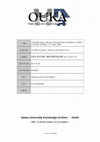
A highly influential report by the Lancet Commission in 2010 called for a major reform of
health ... more A highly influential report by the Lancet Commission in 2010 called for a major reform of
health professional education worldwide and proposed that transformative learning (TL) should be
the main vehicle and outcome of this process (Frenk and Chen et al., 2010, p.6). Transformative
learning, it was argued, would produce health professionals who are enlightened agents of change
(ibid). The idea of TL is not new and its roots can be dated back to Paulo Freire’s critical pedagogy,
outlined in his seminal work Pedagogy of the Oppressed (1968, 1970), and Jack Mezirow’s idea of
perspective transformation, introduced in 1978 and then developed into the theory of TL (Mezirow,
1991). While Freire was interested in the possibilities of education as an emancipatory vehicle
for the poor and illiterate in Latin America, Mezirow’s concerns were with Adult Education and
individual transformation. Early work on transformative learning focused on cognitive and rational
processes that prompted critical reflection, but recent studies, such as Dirkx (2012) and Tisdell
(2012), have moved towards incorporating the emotional, spiritual and embodied dimensions of
learning to embrace a more holistic approach.
This paper offers a critical review of the literature on TL and then explores how this idea
is being implemented in two different higher education settings: study abroad programs and in
professional health education. The review part of this paper draws on both original literature on
TL and three previous review papers (Taylor, 1998; Taylor 2007, Taylor and Snyder, 2012), while
focusing specifi cally on higher education. Using key data bases, we have drawn on articles that
combine the terms transformative learning or education with post-secondary or higher education.
The latter half of the paper explores the vision and practice of TL in study broad programs and
professional health education. As one of two papers focused on TL in the current issue, we hope
that we can contribute to a wider discussion of 21st century teaching and learning in HE in Japan.
Key words: Transformative learning, critical pedagogy, higher education, internationalization,
health education, study abroad
Uploads
Papers by Ariunaa Enkhtur
health professional education worldwide and proposed that transformative learning (TL) should be
the main vehicle and outcome of this process (Frenk and Chen et al., 2010, p.6). Transformative
learning, it was argued, would produce health professionals who are enlightened agents of change
(ibid). The idea of TL is not new and its roots can be dated back to Paulo Freire’s critical pedagogy,
outlined in his seminal work Pedagogy of the Oppressed (1968, 1970), and Jack Mezirow’s idea of
perspective transformation, introduced in 1978 and then developed into the theory of TL (Mezirow,
1991). While Freire was interested in the possibilities of education as an emancipatory vehicle
for the poor and illiterate in Latin America, Mezirow’s concerns were with Adult Education and
individual transformation. Early work on transformative learning focused on cognitive and rational
processes that prompted critical reflection, but recent studies, such as Dirkx (2012) and Tisdell
(2012), have moved towards incorporating the emotional, spiritual and embodied dimensions of
learning to embrace a more holistic approach.
This paper offers a critical review of the literature on TL and then explores how this idea
is being implemented in two different higher education settings: study abroad programs and in
professional health education. The review part of this paper draws on both original literature on
TL and three previous review papers (Taylor, 1998; Taylor 2007, Taylor and Snyder, 2012), while
focusing specifi cally on higher education. Using key data bases, we have drawn on articles that
combine the terms transformative learning or education with post-secondary or higher education.
The latter half of the paper explores the vision and practice of TL in study broad programs and
professional health education. As one of two papers focused on TL in the current issue, we hope
that we can contribute to a wider discussion of 21st century teaching and learning in HE in Japan.
Key words: Transformative learning, critical pedagogy, higher education, internationalization,
health education, study abroad
health professional education worldwide and proposed that transformative learning (TL) should be
the main vehicle and outcome of this process (Frenk and Chen et al., 2010, p.6). Transformative
learning, it was argued, would produce health professionals who are enlightened agents of change
(ibid). The idea of TL is not new and its roots can be dated back to Paulo Freire’s critical pedagogy,
outlined in his seminal work Pedagogy of the Oppressed (1968, 1970), and Jack Mezirow’s idea of
perspective transformation, introduced in 1978 and then developed into the theory of TL (Mezirow,
1991). While Freire was interested in the possibilities of education as an emancipatory vehicle
for the poor and illiterate in Latin America, Mezirow’s concerns were with Adult Education and
individual transformation. Early work on transformative learning focused on cognitive and rational
processes that prompted critical reflection, but recent studies, such as Dirkx (2012) and Tisdell
(2012), have moved towards incorporating the emotional, spiritual and embodied dimensions of
learning to embrace a more holistic approach.
This paper offers a critical review of the literature on TL and then explores how this idea
is being implemented in two different higher education settings: study abroad programs and in
professional health education. The review part of this paper draws on both original literature on
TL and three previous review papers (Taylor, 1998; Taylor 2007, Taylor and Snyder, 2012), while
focusing specifi cally on higher education. Using key data bases, we have drawn on articles that
combine the terms transformative learning or education with post-secondary or higher education.
The latter half of the paper explores the vision and practice of TL in study broad programs and
professional health education. As one of two papers focused on TL in the current issue, we hope
that we can contribute to a wider discussion of 21st century teaching and learning in HE in Japan.
Key words: Transformative learning, critical pedagogy, higher education, internationalization,
health education, study abroad